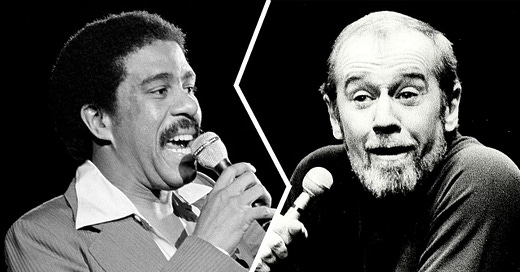Carlin is said to have written every word meticulously and rehearsed his act with a director as a stage actor doing Shakespeare might. This method worked for him. Pryor on the other hand often didn’t know what was going to come out of his mouth when he got onstage. He followed his whims, flexed with the crowd, and was prone to fits of inspiration.
Here’s
’s reply to that:While there are folks who go on stage with literally nothing planned, I think something that's a lot more common (and what I often do when I'm working on new ideas) is to go on stage with some general topics, premises, ideas that could be funny but aren't fully fleshed out yet, maybe with a punchline or two, a few beats planned, but then to discover in the moment what is possible, what connections might arise spontaneously, because our brains are always doing cool things even when we're not planning for them to.
It could depend on your style of comedy as well. For one-liners, having the wording exact makes a lot of sense. For story-tellers or ranters or longer-form comedy of any kind, I think having a broad idea and then just go go going can be very valuable.
Related video re: Carlin and rhythm:
There’s a bit of commentary near the end that stuck with me about whether Carlin’s style could still work today. After all, almost no one is doing anything like his scripted, monologue-y approach now. Is that because he was so unique or has the artform moved past that stylistically?
I’m in SF tomorrow night (5/1):
Some Matt Ruby crowdwork:







I wrestle with this dillemma constantly...where to be tight and where to be loose
I make a deliberate attempt to mix things up and experiment where possible
I still don't have a definitive answer, but I feel I'm getting closer to something that works for me
dear matt,
great piece!
and not just because half of it is me!
but it helps!
thanks for sharing my words!
love
myq